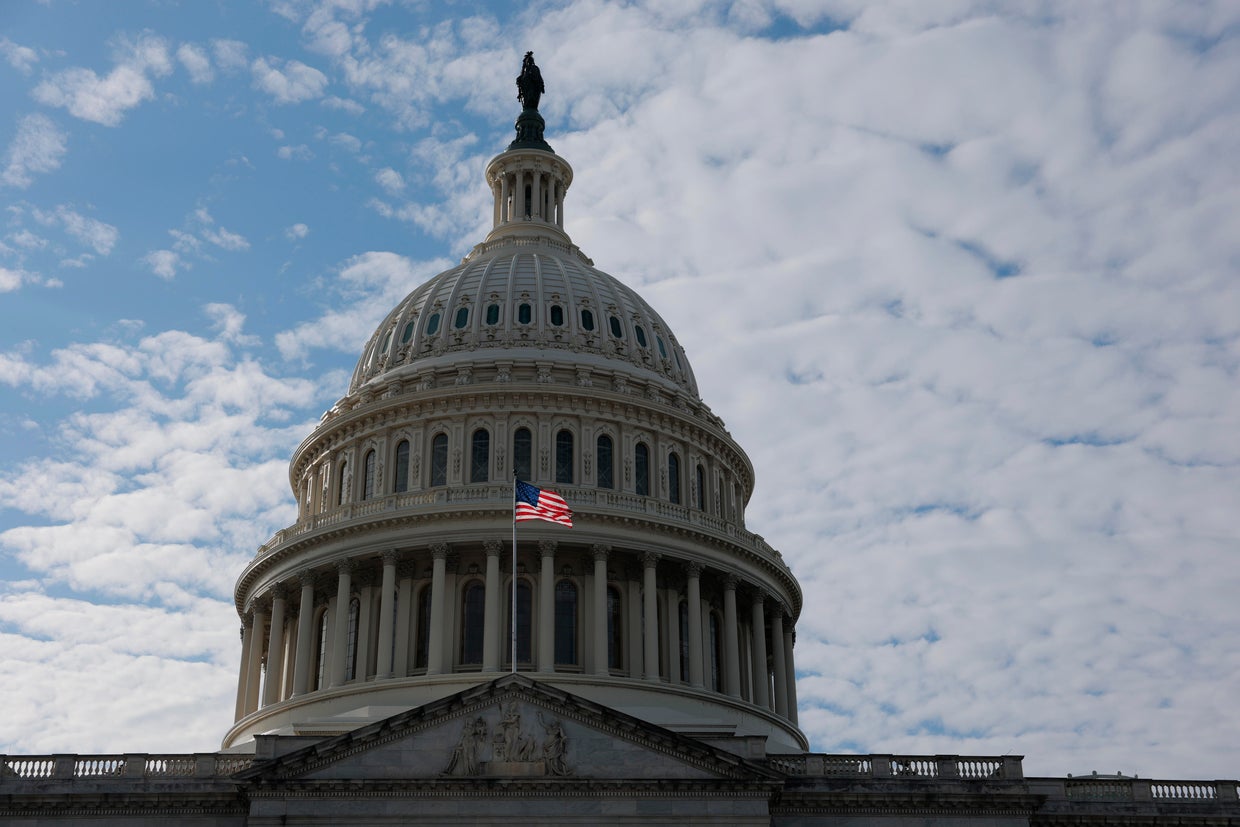Washington — Backlash to President Trump’s tariffs cropped up throughout Capitol Hill on Thursday, as Democrats, and some Republicans, expressed concern about the sweeping levies on foreign imports — while putting forward a handful of possible methods to counter them.
On Wednesday, the president announced a 10% baseline tariff on all U.S. trading partners while increasing levies on dozens of countries that charge higher taxes on American exports. And after what Mr. Trump described as “Liberation Day,” investors appeared spooked, with members of Congress unclear on the path forward.
The response from some lawmakers was swift. Sens. Maria Cantwell, a Washington Democrat and Chuck Grassley, an Iowa Republican, introduced bipartisan legislation Thursday aimed at reasserting Congress’ role over trade policy. The measure, known as the Trade Review Act of 2025, would require the president to give Congress 48 hours’ notice before imposing or raising tariffs. The president would have to include an explanation and analysis of the potential impact, while lawmakers would have the ability to end the levy with a joint resolution.
Grassley said in a statement that Congress has for too long “delegated its clear authority to regulate interstate and foreign commerce to the executive branch,” while Cantwell argued that the same check and balance that prevents the president from unilaterally declaring war should exist “as it relates to protecting our commerce activities.”
“Congress in the War Powers Act decided to reclaim its authority because they thought a president had overreached,” Cantwell said on the Senate floor. “Sen. Grassley and I are trying to do the same thing today by introducing the Trade Review Act of 2025.”
Meanwhile in the House, Rep. Gregory Meeks, a New York Democrat who serves as the ranking member of the House Foreign Affairs Committee, said Wednesday in response to the new tariffs that he plans to introduce a resolution to force a vote on “ending the made up national emergency Trump is using to justify these taxes,” effectively blocking them.
“Republicans can’t keep ducking this — it’s time they show whether they support the economic pain Trump is inflicting on their constituents,” Meeks said in a post on X.
The move would force a vote on the House floor within 15 days. And as the GOP wrestles with how to respond to the tariffs, a Democratic committee aide told CBS News they’re looking to make the effort to pass Meeks’ resolution a bipartisan one. But the resolution would ultimately require the president’s signature or a veto-proof majority, making it a gambit unlikely to succeed.
The efforts come after the Senate approved a resolution Wednesday aimed at blocking the president’s Canada tariffs, as a handful of Republicans bucked their party leader to support the measure. The bill would have to be approved by the House, and Senate Minority Leader Chuck Schumer urged Speaker Mike Johnson to call the House back into session to take up the measure on Thursday, saying, “Donald Trump is using tariffs in the dumbest way imaginable.”
But after House Republicans last month included in a bill to keep the government funded a provision that widely blocks members from forcing a vote on the Canada and Mexico tariffs amid a similar push by Meeks, it appears unlikely that the resolution would receive a vote in the lower chamber.
Whether any of the moves can make it through both chambers and have an impact on the tariffs or trade situation more broadly remains to be seen. The legislative efforts to counter the tariffs come as congressional Republicans have appeared to struggle with how to respond, though few have appeared willing to strongly rebuke the move so far.
Sen. Mike Rounds, a South Dakota Republican, told reporters Thursday that he’s concerned about the markets following the tariffs announcement. Sen. Rand Paul, a Kentucky Republican who was among the four Republicans who voted with Democrats to block the tariffs on Wednesday, told reporters, “There is more pro-trade sentiment in the Republican caucus than was evidenced by the vote yesterday,” adding that he expects after the market response Thursday, “A lot of people are going to be reconsidering the wisdom of this.”
Senate Majority Leader John Thune told reporters Thursday morning that he was waiting to see how things shake out, noting that the market response was “not unexpected.”
“It’s a big policy change, bold policy change, and I think it’s going to take some time to determine what the ultimate impacts are going to be,” Thune said. “Right now, we’re all kind of waiting and seeing and seeing how the administration reacts and what the ultimate permanent policy might look like.”

